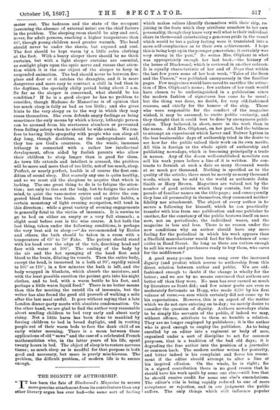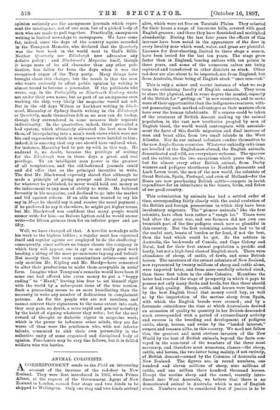DIGNITY OF AUTHORSHIP.
" TT has been the fate of Blackwood's Magazine to secure JL more genuine attachment from its contributors than any other literary organ has ever had—the same sort of feeling which makes sailors identify themselves with their ship, re. joicing in the feats which they attribute somehow to her own personality, though they know very well what is their individual share in them—and entertaining a generous pride in the vessel which would be but a paltry feeling were it translated into a mere self-complacence as to their own achievement. I hope this is being kept up in the younger generation; it certainly was very strong in the past." So writes Mrs. Oliphant in what was appropriately enough her last book,—the history of the house of Blackwood, which is reviewed in another column. It is equally characteristic of her and of Maga that within the last few years some of her best work, "Tales of the Seen and the Unseen," was published anonymously in the familiar pages. Few magazines would have cared to sacrifice the attrac- tion of Mrs. Oliph ant's name ; few authors of her rank would have chosen to be undistinguished in a publication since the modern fashion of signatures has come to be usual ; but the thing was done, no doubt, for very old-fashioned reasons, and chiefly for the honour of the ship. Those who were responsible for the conduct of the magazine wished, it may be assumed, to excite public curiosity, and they thought that it could best be done by anonymous publi- cation. They believed, in short, more in the work than in the name. And Mrs. Oliphant, on her part, had the boldness to attempt an experiment which Lever and Bulwer Lytton in the less businesslike days of authorship tried in the desire to see how far the public valued their work on its own merits. All this is foreign to the whole spirit of authorship and publishing nowadays, which is becoming principally a trade in names. Any of the dozen well-established novelists can sell his work years before a line of it is written. He con- tracts to furnish at such a date so many thousand words at so much per thousand. Nothing is specified as to the quality of the article; there must be merely so many thousand words, which can be sold to the world as authentic John Smith or Mary Brown. Magazines are valued not by the number of good articles which they contain, but by the parade of familiar names on the title-page ; and consequently they lose all personality in themselves, they command neither fidelity nor attachment. The object of every author is to secure a following for himself, which he can practically transfer with him from one publication and one publisher to another, for the constancy of the public bestows itself on men now, not on periodicals; the individual waxes, and the magazine is less and less. There is no reason under the new conditions why an author should have any more feeling for the periodical in which his work appears than a Sheffield manufacturer would feel for the fortunes of some cutler in Bond Street. So long as there are cutlers enough to sell his wares and purchasers ready to buy them, who cares for the middleman ?
A good many pmans have been sung over the increased dignity (and profits) which accrue to authorship from this direct relation between author and public. We are old- fashioned enough to ?oubt if the change is wholly for the better ; and we are by no means convinced that authors are better off than they were. No man has ever earned so much by literature as Scott did ; and few minor poets are even so moderately fortunate as Hogg, who made 2250 by his first volume of verse,—a sum which certainly did not come up to his expectations. However, this is an aspect of the matter which we do not care entering on to-day; we merely desire to consider the question of dignity. Authors nowadays claim to be simply the servants of the public, if indeed we may, without offence, attribute to them so humble a relation. They are no longer employed by publishers ; it is the author who is good enough to employ the publisher. As to being enrolled by an editor into a regiment or body of men, organised under a sort of discipline to act for common purposes, that is a tradition of the bad old days ; it iF degrading the free author into the position of a journalist or common hack. The modern author writes for posterity, and bitter indeed is his complaint and fierce his resent ment if the editor should attempt to alter a line of his inspired effusion. On the whole, he is right ; lot in a signed contribution there is no good reason that he should have his work spoilt by some one else,—still less that he should receive credit for some one else's emendations. The editor's role is being rapidly reduced to one of mere acceptance or rejection, and in our judgment the public suffers. The only things which still influence popular
opinion seriously are the anonymous journals which repre- sent the intelligence, not of one man, but of a picked body of men who are made to pull together. Practically, anonymous writing is limited nowadays to newspapers. We have come far, indeed, since the days of the country squire recorded in the Tennyson Memoirs, who declared that the Quarterly was the best book in the world next to God's Bible. Neither Quarterly nor Edinburgh now advocates any definite policy ; and Black-wood's Magazine itself, though it keeps more of its old character than any other pub- lication, has fallen far from the days when it was the recognised organ of the Tory party. Many things have brought about this change; but the result is that the man who wants seriously to affect public opinion by writing is almost bound to become a journalist. If the publicists who wrote, say, in the Fortnightly or Nineteenth Century wrote not under their own name, but as part of an anonymous crew working the ship, very likely the magazine would not sell. But in the old days Wilson or Lockhart writing in Black- wood, Macaulay or Sydney Smith writing in the Edinburgh or Quarterly, made themselves felt as no man can do to-day, though they surrendered in some measure their separate individuality. In the quarterlies, indeed, there prevailed a bad system, which ultimately alienated the best men from them, of interpolating into a man's work views which were not his, and expressions which in many cases were hateful to him ; indeed, it is amazing that any one should have endured what, for instance, Macaulay had to put up with in this way. He endured it, no doubt, because the privilege of writing for the Edinburgh was in those days a great and real privilege. To an intelligent man power is the greatest of all temptations, and the old-fashioned journals could and did offer that as the principal incentive to write. The first Mr. Blackwood expressly stated that although he made a principle of giving prompt and liberal payment for whatever he published, he never would hold out money as the inducement to any man of ability to write. He believed fervently in his magazine, and declined to go into the market and bid against others. If an able man wanted to say his say in Maga he should say it and receive the usual payment ; if he preferred to say it elsewhere, he might get higher terms, but Mr. Blackwood was confident that many people would sooner write for him—as Bulwer Lytton said he would sooner write—for fifteen guineas than for an inferior paper and get fifty.
Well, we have changed all that. A novelist nowadays sells his work to the highest bidder ; a regular mart has organised itself and regular agents are employed to do the chaffering - consequently, since authors no longer choose the company in which they will appear, one is apt to see really good work heading a string of the most promiscuous tag-rag and bobtail. Not merely that, but even conscientious artists—one need only mention Mr. Kipling and Mr. Hardy—have consented to alter their productions to make them acceptable in serial form. Imagine what Tennyson's remarks would have been if some one had offered him extra money to put a "happy ending" to "Maud," leaving him free to set himself right with the world by a subsequent issue of the true version. Such a proceeding seems to us more humiliating than the necessity to write any number of dedications to complaisant patrons. As for the people who are not novelists, and cannot convert their signatures to the same extent into cash, they may gain, no doubt, a more rapid and general notoriety by the habit of signing whatever they write ; but for the real reward of thought or dialectic vigour in magazine work, which is the power to influence other minds, they are far worse off than were the gentlemen who, with not inferior talents, consented to sink their own personality in the collective unity of some organised and disciplined body of opinion. Free-lances may be very fine fellows, but it is drilled soldiers who win battles.







































 Previous page
Previous page